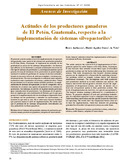| dc.contributor.author | Anfinnsen, Bente | |
| dc.contributor.author | Aguilar Stoen, Mariel | |
| dc.contributor.author | Vatn, A. | |
| dc.date.accessioned | 2015-03-19T20:52:54Z | |
| dc.date.available | 2015-03-19T20:52:54Z | |
| dc.date.issued | 2009 | |
| dc.identifier | 473910 | es_ES |
| dc.identifier.issn | 1022-7482 | es_ES |
| dc.identifier.uri | https://repositorio.catie.ac.cr/handle/11554/5735 | |
| dc.description | 5 ilustraciones | es_ES |
| dc.description.abstract | El presente artículo analiza el nivel de implementación de opciones silvopastoriles como parte de los sistemas de producción ganadera en El Chal, Petén, Guatemala. Se exploraron las actitudes de los productores/as acerca de los sistemas silvopastoriles y los factores que influyen en las decisiones y acciones relacionadas con el uso de este tipo de sistemas de producción. La investigación muestra que el proceso de toma de decisiones de los productores se puede explicar mediante el análisis de problemas de manejo de recursos naturales, basado en un marco teórico de sistemas complejos y economía institucional clásica. En esta investigación se utilizaron tanto métodos cualitativos como cuantitativos en la toma y análisis de datos. Todos los productores en la muestra tienen actitudes positivas a la implementación de sistemas silvopastoriles, lo cual se comprueba con la existencia de al menos una opción silvopastoril en sus sistemas de producción. Sin embargo, los niveles de implementación presentan gran variación entre los productores. | es_ES |
| dc.description.abstract | The article analyzes the current level of implementation of silvopastoral options by cattle farmers in El Chal, Petén, Guatemala. It also discusses their attitudes toward these types of diversified production systems and the factors influencing their decisions and actions. This study demonstrates that farmers’ decision-making process can be explained by a framework for analyzing resourceuse problems, based on complex systems theory and classical institutional economics. The investigation used both qualitative and quantitative methods in its data collection and analysis. All farmers interviewed showed positive attitudes toward the implementation of silvopastoral systems, and they all already use at least one silvopastoral option in their production systems. The levels of implementation do, however, vary greatly among farmers. The farmers’ decision making is influenced by a combination of factors. | en_EN |
| dc.format.mimetype | pdf | |
| dc.language.iso | es | es_ES |
| dc.publisher | CATIE, Turrialba (Costa Rica) | es_ES |
| dc.relation.ispartof | Agroforestería en las Américas, número 47 (2009), páginas 20-26 | |
| dc.rights | info:eu-repo/semantics/openAccess | es_ES |
| dc.rights.uri | https://creativecommons.org/licenses/by-nc-nd/4.0/ | |
| dc.subject | SISTEMAS SILVOPASCICOLAS | es_ES |
| dc.subject | PRODUCCION ANIMAL | es_ES |
| dc.subject | CONSERVACION DE LOS RECURSOS | es_ES |
| dc.subject | ADOPCION DE INNOVACIONES | es_ES |
| dc.subject | GANADERIA | es_ES |
| dc.subject | TOMA DE DECISIONES | es_ES |
| dc.subject | GUATEMALA | es_ES |
| dc.title | Actitudes de los productores ganaderos de El Petén, Guatemala, respecto a la implementación de sistemas silvopastoriles | es_ES |
| dc.title.alternative | Cattle farmers’ attitudes toward the implementation of silvopastoral systems in Peten, Guatemala | es_ES |
| dc.type | Artículo | es_ES |
| dc.journal.issueNumber | 47 | |
| dc.journal.pages | 20-26 | |



